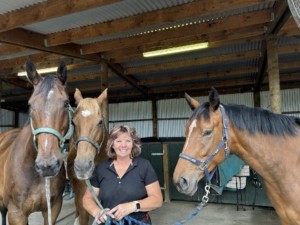
EIT | Te Pūkenga Executive Dean and Professor of One Welfare, Professor Nat Waran.
Ground-breaking research into how thoroughbred racehorses express positive emotions in their interactions with humans is being done by a team including EIT | Te Pūkenga Executive Dean and Professor of One Welfare, Professor Nat Waran.
Professor Waran, who is an internationally recognised expert on equine behaviour and welfare, is working with two other researchers from Australia and the United Kingdom. They have secured substantial funding from the Hong Kong Jockey Club (HKJC) Equine Welfare Foundation for a three-year programme of research aimed at improving equine welfare with a specific focus on the racehorse industry.
The project began in February. The research team is led by Prof Waran with Prof Hayley Randle, Professor of Equine Science at Charles Sturt University in Australia, in collaboration with Associate Prof Jane Williams, from Hartpury University in the United Kingdom.
This follows on from Professor Waran being appointed last year by the Fédération Equestre Internationale (FEI), which is the world governing body for horse sport, to chair the Independent Equine Ethics and Wellbeing Commission. The Commission was tasked with proactively addressing current and future societal concerns related to the ethics and welfare of horse use in sport.
Prof Waran has just returned from Lausanne in Switzerland where she presented to the FEI Sports Forum on the Commission’s proposed vision and draft recommendations. The recommendations called for a strategic approach involving a future focussed vision, objectives, suggested areas of activity and key enablers. It is proposed that the vision for achieving a ‘Good Life for Horses’ involves consideration by the FEI Board of six early recommendations presented in 2022, as well as a further 24 recommendations for ensuring equine welfare in sport is paramount. Professor Waran outlined how through accepting and actioning these recommendations, the equine industry would address concerns expressed by equestrians and the public in relation to horse welfare and in so doing, maintain a social licence in relation to the future of equine involvement in sport.
Regarding the research she is undertaking, Prof Waran says: “We have seen rising societal concerns about the use and treatment of animals across a range of industries, and this is especially the case where animals are involved in sport such as in the thoroughbred racing industry’.”
“To address such concerns the racing industry has committed to ensuring that equine welfare is a strategic priority. Ensuring high standards of horse welfare is important for maintaining and strengthening public confidence and for permitting horse racing to continue to have a social licence to operate, to remain trusted and self-regulating. “
“This means that we need to know a lot more about how racehorses feel about their life experiences on and off the track, and how coping with the living, travelling, and working environment impacts upon their welfare. In order to properly assess a horse’s welfare there is an urgent need to develop validated practical indicators or tools that provide information about not just negative emotions, such as fear or stress, but also positive ones such as pleasure and contentment. This is what our research will be addressing.”
Prof Waran says the researchers are grateful to the Hong Kong Jockey Club for “generously investing in this novel research to help increase our understanding of horse emotions, and more specifically positive emotional expression to contribute much needed information to advance their welfare.”
Prof Randle says “providing funding for this kind of research demonstrates the commitment of the HKJC to supporting rigorous research that seeks to provide objective evidence of emotions in horses.”
“This is particularly important as the way that welfare is measured has changed. The cumulative effect of a horse’s experiences is now being recognised, from birth to retirement. People are taking horses’ mental welfare much more seriously than ever before. “
Prof Waran says: “HKJC have provided our team with a unique opportunity to gain insight into how horses’ feel, and this work will contribute in a practical way to help advance our knowledge of how to provide for the wellbeing of all horses used in leisure and sport.”
The HKJC Equine Welfare Foundation says it is passionately committed to constantly improving the quality of life of the thoroughbred racehorse through research and applying the knowledge that research yields, supporting the application of knowledge to drive practical change to improve the quality of life of the racehorse and to provide education to the public about equine health and welfare.
There has been considerable interest in the work Prof Waran has been doing internationally to define and promote a Good Life for Horses involved in sport and as a consequence she has been invited to present to both the New Zealand Thoroughbred Racing Welfare Forum at the end of May in Cambridge, and also at the New Zealand Equestrian Sports’ members’ forum in Christchurch in July.
